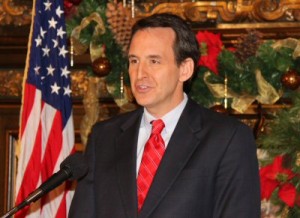Members of the Minnesota House and Senate went home last Monday for their Easter/Passover break. They return Tuesday. In terms of legislative days they are more than half done with the 2010 Legislative session. In terms of number of votes and the heaviest lifting of balancing the budget, they are not halfway there. At any rate, this point in the session could be considered “halftime”.
In the first half of the 2010 Legislative session, three noteworthy things happened. Each one of them gave House Speaker Margaret Anderson Kelliher (who is a DFL candidate for Governor) a chance to show her leadership skills, and she failed at each opportunity.
The first is the capital investment (or borrowing bill, or debt bill, or whatever you want to call it) “bonding bill”. Democrat leadership in the House and Senate, true to form, passed a larger borrowing package than Governor Tim Pawlenty preferred. The $1,000,000,000 monstrosity sailed through the House and Senate, and the conference committee worked out the differences. Before the House voted on the conference committee report, House Republican Leader Kurt Zellers moved to reject the conference committee report and send it back to conference committee. This motion failed and the Democrat-led House and Senate each voted to pass the conference committee report and send the bill on to the Governor.
Except Democrat leadership had second thoughts and took the unusual action of not sending the bill on to the Governor. They decided to put the conference committee back to work as a “working group”. Their job was to put a couple projects in the Governor wanted so he would be less likely to veto the whole bill. This strategy worked to some extent, but the Governor used his line-item veto authority to cut about $300 million worth of projects out of the bill.
The second major action by the Legislature in the first half of the 2010 session was the general assistance medical care (GAMC) fix. Last year, the Governor had unalloted money the Legislature had appropriated for this program that provides medical care for the poorest of the poor. Unfortunately, GAMC was an inefficient program that was growing at an unsustainable rate. This year Democrats passed legislation to restore this money without any reform to the program, and the Governor vetoed the bill. Speaker Kelliher made the decision to bring the bill up for an override vote in the House in spite of the fact a bipartisan group led by Rep. Erin Murphy (DFL – St. Paul) and Rep. Matt Dean (R – Dellwood) was close to working out an innovative solution.
House Majority Leader Tony Sertich (DFL – Chisholm) stated on the House floor that there were only two choices. Either override the Governor or let the Governor’s veto stand. Democrats failed at getting the 2/3 vote necessary to override, so the Governor’s veto stood. Within a couple days, the group working on a compromise announced they had a deal.
Eventually a bill came forward to change GAMC into a more efficient program that provides better health care to the poor at less cost to the taxpayers. So much for Sertich’s “there are only two choices” philosophy. Speaker Kelliher knew the bipartisan group was close to a deal before she allowed the override attempt to come up. She could have waited until another solution to come forward. But the override attempt was shameless pandering to her DFL base to win votes in her quest for her party’s endorsement.
However, the real winners were House Republicans. By sticking together, they prevented the veto override, and put forward much of the final package. They showed that Republicans are not the party of no, and that they care that the poorest of the poor get the medical care they need.
The third major action by the Legislature was the “balancing” of one-third of the budget deficit. A bill was passed that provided funding, or in most cases, cut funding to state agencies and programs. Democrat leadership took the low hanging fruit in the first half of the session. However, this bill did not address K-12 education or Health and Human Services, which combined, comprise most of the budget.
Democrats will brag to their constituents back home that they solved one-third of the deficit. However, they are setting up for one of three things (or a combination of these things) to happen. They will either have to cut K-12 education, cut nursing homes or raise taxes. Now some Democrats are willing to cut K-12 educatoin. Some Democrats are willing to cut nursing homes. However, very few Democrats are averse to raising taxes. Except in an election year like this one, they may be gun-shy. But do they really want to hold the line on taxes, just to risk alienating their core constituencies in the teachers’ union or the welfare rights crowd? Again, this leaves Speaker Kelliher in a precarious position.
Some speculate Democrats will quickly pass budget cuts to these areas without a tax increase and adjourn sine die, leaving the rest to Governor Pawlenty. If he signs them into law it’s all on his shoulders since it’s a waste of time sending him a tax increase bill, the philosophy goes. But the Governor still has the power to call the Legislature back into special session, saying the Legislature didn’t finish its work.
This remains to be seen. But the harsh reality is that it’s much tougher to be in the majority and have to make the difficult decisions than be in the minority and criticize the decisions that are made, like Democrats did during the last budget deficit.
In the interest of full disclosure, I am an employee of the Minnesota House of Representatives with the Republican Caucus. This website is not paid for nor operated by any legislator, legislative caucus, candidate or political party. Opinions expressed herein are strictly those of the website administrator, and not necessarily those of any legislator, legislative caucus, candidate or political party.


